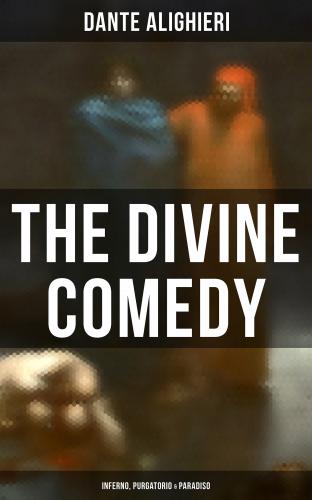Sit with his philosophic family.
All gaze upon him, and all do him honour.
There I beheld both Socrates and Plato,
Who nearer him before the others stand;
Democritus, who puts the world on chance,
Diogenes, Anaxagoras, and Thales,
Zeno, Empedocles, and Heraclitus;
Of qualities I saw the good collector,
Hight Dioscorides; and Orpheus saw I,
Tully and Livy, and moral Seneca,
Euclid, geometrician, and Ptolemy,
Galen, Hippocrates, and Avicenna,
Averroes, who the great Comment made.
I cannot all of them pourtray in full,
Because so drives me onward the long theme,
That many times the word comes short of fact.
The sixfold company in two divides;
Another way my sapient Guide conducts me
Forth from the quiet to the air that trembles;
And to a place I come where nothing shines.
Canto V. The Second Circle: The Wanton. Minos. The Infernal Hurricane. Francesca da Rimini.
Thus I descended out of the first circle
Down to the second, that less space begirds,
And so much greater dole, that goads to wailing.
There standeth Minos horribly, and snarls;
Examines the transgressions at the entrance;
Judges, and sends according as he girds him.
I say, that when the spirit evil-born
Cometh before him, wholly it confesses;
And this discriminator of transgressions
Seeth what place in Hell is meet for it;
Girds himself with his tail as many times
As grades he wishes it should be thrust down.
Always before him many of them stand;
They go by turns each one unto the judgment;
They speak, and hear, and then are downward hurled.
"O thou, that to this dolorous hostelry
Comest," said Minos to me, when he saw me,
Leaving the practice of so great an office,
"Look how thou enterest, and in whom thou trustest;
Let not the portal's amplitude deceive thee."
And unto him my Guide: "Why criest thou too?
Do not impede his journey fate-ordained;
It is so willed there where is power to do
That which is willed; and ask no further question."
And now begin the dolesome notes to grow
Audible unto me; now am I come
There where much lamentation strikes upon me.
I came into a place mute of all light,
Which bellows as the sea does in a tempest,
If by opposing winds 't is combated.
The infernal hurricane that never rests
Hurtles the spirits onward in its rapine;
Whirling them round, and smiting, it molests them.
When they arrive before the precipice,
There are the shrieks, the plaints, and the laments,
There they blaspheme the puissance divine.
I understood that unto such a torment
The carnal malefactors were condemned,
Who reason subjugate to appetite.
And as the wings of starlings bear them on
In the cold season in large band and full,
So doth that blast the spirits maledict;
It hither, thither, downward, upward, drives them;
No hope doth comfort them for evermore,
Not of repose, but even of lesser pain.
And as the cranes go chanting forth their lays,
Making in air a long line of themselves,
So saw I coming, uttering lamentations,
Shadows borne onward by the aforesaid stress.
Whereupon said I: "Master, who are those
People, whom the black air so castigates?"
"The first of those, of whom intelligence
Thou fain wouldst have," then said he unto me,
"The empress was of many languages.
To sensual vices she was so abandoned,
That lustful she made licit in her law,
To remove the blame to which she had been led.
She is Semiramis, of whom we read
That she succeeded Ninus, and was his spouse;
She held the land which now the Sultan rules.
The next is she who killed herself for love,
And broke faith with the ashes of Sichaeus;
Then Cleopatra the voluptuous."
Helen I saw, for whom so many ruthless
Seasons revolved; and saw the great Achilles,
Who at the last hour combated with Love.
Paris I saw, Tristan; and more than a thousand
Shades did he name and point out with his finger,
Whom Love had separated from our life.
After that I had listened to my Teacher,
Naming the dames of eld and cavaliers,
Pity prevailed, and I was nigh bewildered.
And I began: "O Poet, willingly
Speak would I to those two, who go together,
And seem upon the wind to be so light."
And, he to me: "Thou'lt mark, when they shall be
Nearer to us; and then do thou implore them
By love which leadeth them, and they will come."
Soon as the wind in our direction sways them,
My voice uplift I: "O ye weary souls!
Come speak to us, if no one interdicts it."
As turtle-doves, called onward by desire,
With open and steady wings to the sweet nest
Fly through the air by their volition borne,
So came they from the band where Dido is,
Approaching us athwart the air malign,
So strong was the affectionate appeal.
"O living creature gracious and benignant,
Who visiting goest through the purple air
Us, who have stained the world incarnadine,
If were the King of the Universe
